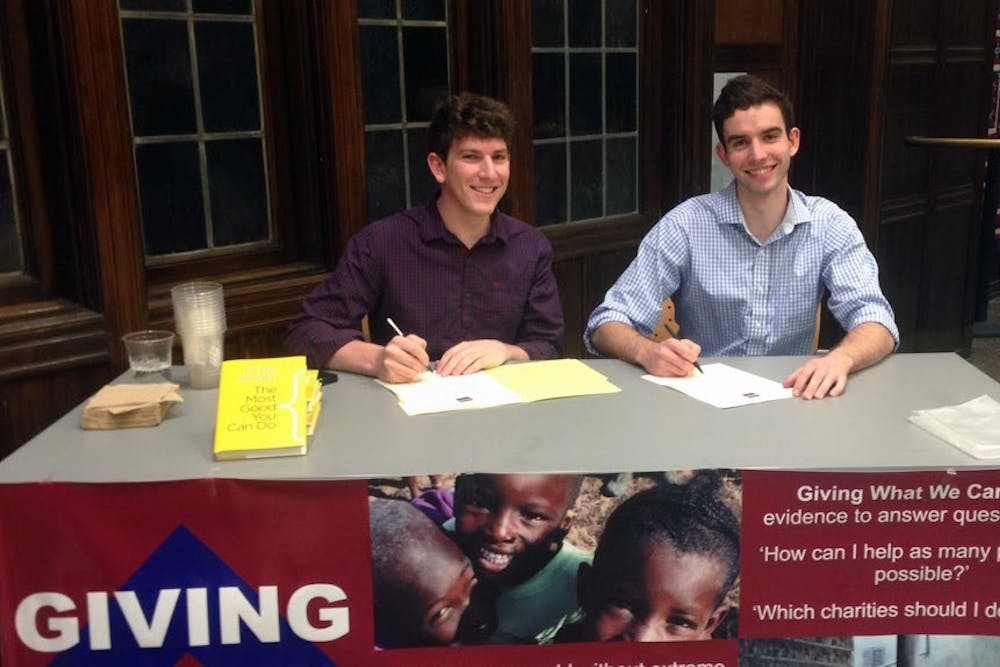
Mark Toubman (left) and Peter Buckley (right) signed the pledge to donate 10% of their future incomes to effective charities.
Credit: Courtesy of Rossa O'Keeffe-O'DonovanFor the rest of their lives, four Penn students have decided to give 10 percent of what they earn to charity.
On Monday, the students joined Giving What We Can, a national organization whose 1,000 members have pledged to donate 10 percent of their future lifetime income to charities working to eradicate poverty. Part of a movement towards “effective altruism,” GWWC aims to do the most possible good with the money available. Effective altruism means not just giving more, but giving more effectively.
Peter Buckley, Wharton and Engineering sophomore and co-founder of GWWC Penn, was among the four Penn students to make the pledge. Buckley is a firm believer in effective altruism. Given one’s background and education, the most effective way to do good for the world is often to make a lot of money and give it away to charity, Buckley explained. He said he has found that many people struggle with the notion that it can be better to give money than time in order to do the most good.
“What’s hard to get over is that it can feel good to be there, be hands-on and feel that you’re making a difference,” Buckley said. However, he said it is possible to derive this same feeling simply from donating money.
“Ultimately, if you really care about the people you’re helping, you’ll do what’s best to help them, regardless of how it’s making you feel,” he said. As an added benefit, choosing to give back monetarily is congruent with the giver’s desires – there does not have to be a choice between doing good and living the life you want.
Rossa O'Keeffe-O'Donovan started Penn's GWWC chapter last year. He is on the team that performs extensive research on nonprofit organizations and compiles a list of independently verified top charities. Although members are encouraged to donate to the charities GWWC deems effective, ultimately each member donates to the organizations according to individual preference. Members can also elect to donate their income to the GWWC Donor-Advised Fund, which splits equally between the recommended charities.
“I’m more inclined to give more because I know my money is going to the best places, and it’s going to make a real difference. I think a lot of apathy comes from people thinking the money is just wasted,” said Rossa O'Keeffe-O'Donovan, who started Penn’s GWWC chapter last year.
O'Keeffe-O'Donovan, who is pursuing his Master’s degree in Development Economics at Penn, made the 10 percent pledge in 2011 when he got his first job. Having identified strongly with utilitarianism while studying ethics at Oxford University, O'Keeffe-O'Donovan believes the pledge aligns well with his life view.
Though he knows 10 percent of his future income is a large amount of money, College sophomore Mark Toubman is excited to pledge the 10 percent to effective charities.
“What I’ve come to realize is that money doesn’t always equate with happiness…Donating to charity is something that I want to incorporate into my life, and this gives me a concrete, tangible way to do that,” he said.
Toubman, who has had a lifelong desire to help the world, was never satisfied with his previous experiences in volunteering and fundraising. Donating through GWWC gives him the confidence and satisfaction that his money is being used in the most effective way possible.
In advocating for effective altruism, Toubman said he has found it especially difficult to convince other undergraduates to donate to charity. Ultimately, he believes it all comes down to creating a budget.
“If only everyone gave 10 percent of their income to charity, the world would be a significantly better place,” Toubman said.
A similar student charity group focused on effective altruism, One for the World, or OFTW, was founded at Wharton last year specifically for MBA students. OFTW was founded on the notion that Wharton MBAs struggle to reconcile their careers in the private sector with their desire to give back meaningfully. OFTW allows Wharton MBAs to give of their financial resources instead of their time.
“Sometimes to give charitably, people need a nudge. It’s priority number 27 on our list of things to do,” OFTW President and second-year Wharton MBA student Amaan Banwait, said.
“Everyone wants to give, but it just doesn’t really happen,” he added.
OFTW’s solution is to ask Wharton MBAs to pledge 1 percent of their future earnings to effective organizations that serve the world’s poor. Although 1 percent will be unnoticeable to most, this amount becomes significant when aggregated across a whole class, especially as alumni advance in their careers. Banwait’s motivation to pledge his income to effective organizations stems from his experience working at the Clinton Organization in Uganda.
“I found so much waste in the sector, but on the other hand there’s so much need...There’s a need to channel the money that you do have to the most effective organizations,” he said. “This is a way for me to feel like I’m doing some small part in the world even though I’m focusing my career on other things.”
This year, OFTW aims to have 200 graduating MBAs sign up. Last year, 45 members of the graduating class made the pledge. This year that number is up to 60, including one faculty member. OFTW is expanding to Harvard Business School, Penn Law and the undergraduate community at Penn.
The Daily Pennsylvanian is an independent, student-run newspaper. Please consider making a donation to support the coverage that shapes the University. Your generosity ensures a future of strong journalism at Penn.
DonatePlease note All comments are eligible for publication in The Daily Pennsylvanian.








